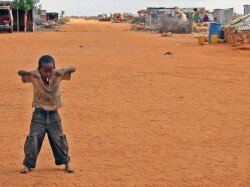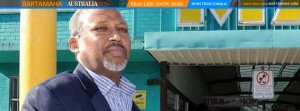Trouble on Somalia’s Third Front: Galkayo
 Somalia can achieve peace. Much of the country already has the ingredients for it, but simply lacks a cohesive government with a unified strategy for security and development.
Somalia can achieve peace. Much of the country already has the ingredients for it, but simply lacks a cohesive government with a unified strategy for security and development.
To make matters worse, many internationals who have the power to improve the situation in Somalia alongside local leaders tend to misdiagnose the ills and then prescribe the wrong treatments. This dilemma has become painfully clear again with this week’s renewed violence in the central city of Galkayo, which has forced hundreds of displaced families to flee for their second or third time.
Galkayo is Somalia’s third front, an issue associated with, but distinct from, the Islamic radical insurgency and the Somaliland-Puntland border dispute…
To clarify for those who relish detail, Somalia is in three parts: Somaliland (northwest, trying to be independent), Puntland (northeast), and southern Somalia (hit by insurgency). Galkayo is a city on the dividing line between Puntland and southern Somalia.
The Darod clans on the north side of town tend to feel bound to the Puntland state government to the north while the Hawiye clans on the south side of town feel connected to the Hawiye government in the self-made “Galmudug” state in southern Somalia.
During the past years’ fighing in Somalia’s deep south, thousands of people flooded north crossing through this divided town. Those who were Darod clan tended to look for aid agency help or family members to stay with on Galkayo’s north side. But other groups like the Rahanweyne also flooded there. Now, locals in north Galkayo apparently have heard rumors that families staying there in refuge, Darod or Rahanweyne or other groups, who have drawn low-wage jobs and aid away from the residents, may have had affiliation with the Islamic radical insurgents of the south.
Arguments over the rumors overwhelmed the capacity of local security. Shots were fired. Then many local residents began kicking out many of the families from displacement shelters. Most fled south to the Bay and Bakool regions where they will likely be an unwanted minority, as well. And another crisis is born.
The most painful foul against the peace process in Somalia is the UN and aid community’s continued habit of working exclusively with the state authorities, often neglecting the currently more powerful traditional leadership and Islamic leader networks because they are so complex.
The UN has done a fantastic job with aid agencies in planning improvements for security, health, and more. But with very little funding available in the Somali government and from donors for a full security force and citizen protection group for displaced families in camps, most families have to rely on their traditional leaders for protection. The best and brightest of the traditional leaders have fled far and wide, leaving the less capable to rule over their blood line.
What this means is that if a displaced “Rahanweyne” family’s boy gets punched by a “Darod” kid from town, then the displaced family, who does not trust the local “Darod” police, will seek help from their local elders. If the credentialed elders have fled abroad, then basically the oldest man in the group will likely be the decision-maker. He may then ask a group of Rahanweyne men to grab their rifles and go into town to talk to the accused Darod boy’s family to demand justice.
The Darod family may call the police to address the dispute, but the police are so thin they take hours or days to get to the scene. A fight breaks out. And there are not enough police available to break it up. This is what most of the conflict in Somalia is about.
As some leaders and aid agencies are figuring out, these feuds can rarely be resolved by the police. Elders from related clans need to come to talk to the elders who originally sanctioned the posses which started the fight. Then those impartial elders will total the damage to each side and have the one who caused the most damage compensate the other side for their losses.
Here’s a story from Abduba Mollu Ido, a Kenyan writer and development consultant and a trusted colleague of mine, about the blood fued issue in the African Horn. For updates on Galkayo, the peace process, and humanitarian aid, follow the Somalia page at ReliefWeb.
____
Source: WAR & PEACE
[Photo: Galkayo’s airport IDP settlement, Daniel J Gerstle]
Comments
comments
 Calendar
Calendar






































